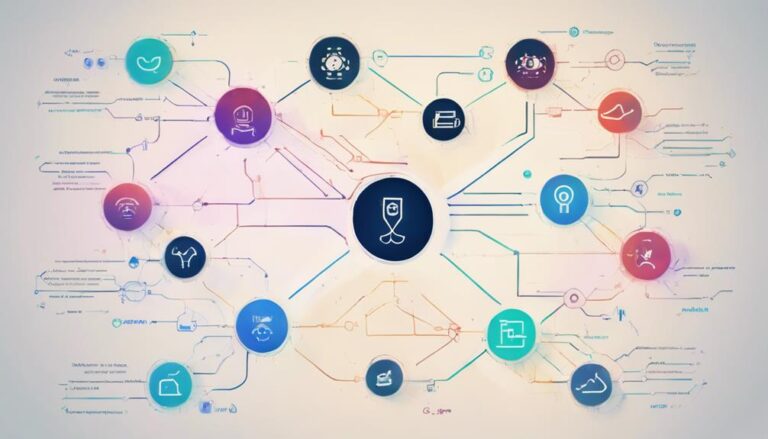AI-powered marketing strategies use algorithms and predictive analytics to turn customer data into actionable insights. I've found tools like Salesforce Einstein and Adobe Sensei invaluable for automating processes and targeting customers more precisely. With AI, I can anticipate customer needs and deliver personalized experiences that boost engagement and ROI. For instance, companies like Coca-Cola saw a 57% revenue increase due to AI. If you're keen on enhancing targeting precision, automating content, and driving customer satisfaction, these strategies are a game-changer. Stay with me, and you'll uncover how to transform your marketing approach with AI.
Key Takeaways
- Utilize machine learning algorithms to analyze and predict customer behavior.
- Implement marketing automation tools to streamline and optimize campaigns.
- Employ predictive analytics to anticipate customer needs and trends.
- Leverage AI for personalized content generation and targeted marketing.
- Use AI-driven tools for enhanced customer journey mapping and engagement.
Understanding AI Marketing
Understanding AI marketing means leveraging artificial intelligence to transform data into actionable insights for enhancing customer engagement and boosting revenue.
By using AI tools, I can understand customer behavior and create personalized experiences that resonate with my audience. Machine learning algorithms allow me to analyze customer data efficiently, enabling the creation of targeted marketing campaigns that are more effective.
Predictive analytics help me anticipate customer needs and trends, which improves customer satisfaction and loyalty. Marketing automation streamlines processes, making my strategies more efficient and scalable.
With AI marketing, I don't just react to customer behaviors but predict and shape them, ensuring that my campaigns are always one step ahead. This approach drives both innovation and measurable results.
Key AI Marketing Tools
When leveraging AI marketing tools like Salesforce Einstein, Acquisio, Marketo, Adobe Sensei, and Optimizely, I can transform my marketing strategies with advanced data-driven insights and automation.
These AI Marketing Tools utilize machine learning and data analysis to optimize marketing campaigns and enhance customer engagement. For instance, Salesforce Einstein provides predictive analytics that help me anticipate customer needs, while Acquisio automates ad campaigns for better ROI.
Marketo excels in personalization, allowing me to tailor content to individual preferences. Adobe Sensei offers powerful image recognition and data insights, and Optimizely enhances A/B testing to fine-tune my strategies.
Benefits of AI in Marketing

When it comes to AI-powered marketing, the benefits are substantial. With AI, I can achieve enhanced targeting precision, leading to a 61% improvement in customer engagement and a 56% increase in click-through rates.
Additionally, automated content generation not only saves time but also reduces marketing costs by up to 30%.
Enhanced Targeting Precision
AI-powered marketing strategies dramatically enhance targeting precision by analyzing extensive customer data and delivering hyper-targeted campaigns. Leveraging AI algorithms, I can dissect customer behavior and preferences to tailor personalized content for specific customer segments.
This precision in targeting offers several key benefits:
- Increased Conversion Rates: By predicting customer responses, I guarantee that marketing messages hit the mark, leading to higher conversion rates.
- Improved ROI: Precise targeting means marketing budgets are spent more effectively, boosting return on investment.
- Enhanced Customer Engagement: Delivering content that resonates with specific preferences keeps customers engaged and loyal.
- Data-Driven Decisions: AI provides insights from vast customer data, enabling me to make informed marketing decisions.
Automated Content Generation
Building on the precision of targeted campaigns, automated content generation leverages AI to streamline the creation of personalized and consistent marketing materials. AI algorithms analyze vast datasets to produce targeted and relevant content, driving higher customer engagement and conversion rates.
Through automated content generation, I guarantee consistency in messaging and branding across all channels, which is essential for maintaining a cohesive brand image. Additionally, AI-driven tools optimize SEO strategies by creating content that aligns with search engine algorithms, enhancing visibility.
Furthermore, the scalability offered by AI allows me to efficiently expand marketing efforts without compromising quality. This not only improves ROI but also boosts overall customer satisfaction, making AI an invaluable asset in modern marketing strategies.
Customer Journey Mapping
When I use AI to map the customer journey, I can leverage data-driven personalization techniques to craft highly targeted marketing messages.
Predictive analytics further enhances this by forecasting customer behavior, allowing me to preemptively address their needs and preferences.
These strategies not only boost customer satisfaction but also greatly improve ROI.
Data-Driven Personalization Techniques
Customer journey mapping with AI allows us to create highly personalized experiences by leveraging data insights at every touchpoint. By analyzing customer behavior, we can optimize the journey to deliver relevant content and offers in real-time. This data-driven approach enhances engagement and boosts conversion rates. AI identifies key interaction points and preferences, enabling us to tailor messaging effectively.
Here's how AI-powered customer journey mapping works:
- Analyze Customer Behavior: Understand patterns to predict needs and preferences.
- Identify Key Interaction Points: Pinpoint pivotal moments for targeted interventions.
- Deliver Relevant Content: Provide personalized offers and information in real-time.
- Optimize Engagement: Adjust strategies to maximize customer satisfaction and conversion rates.
Predictive Analytics Integration
Integrating predictive analytics into customer journey mapping helps guarantee customer needs are met and marketing efforts are tailored with precision. By leveraging AI and machine learning algorithms, we can dissect vast amounts of data to identify customer behavior, trends, and patterns.
This data analysis enables us to forecast customer needs and optimize marketing campaigns for maximum impact. Through predictive analytics, personalized engagement becomes achievable, leading to improved conversion rates and enhanced customer experiences. Targeted messaging at each stage of the customer journey ensures we're addressing specific preferences and potential actions.
Ultimately, integrating predictive analytics into our strategies helps us stay ahead of the curve, offering innovative solutions that drive increased ROI and elevate our marketing efforts.
AI in Personalization

Leveraging AI in personalization transforms marketing by delivering tailored experiences based on precise data insights. By harnessing machine learning, we can analyze customer behavior and preferences to craft personalized experiences that resonate deeply.
Here's how AI in marketing enhances customer engagement and boosts conversion rates:
- Data Insights: AI algorithms sift through vast amounts of data to identify patterns in customer behavior.
- Personalized Experiences: Tailored marketing messages are crafted based on individual preferences.
- Customer Engagement: Targeted interactions increase customer satisfaction and loyalty.
- Conversion Rates: Precise targeting and relevant messaging lead to higher conversion rates and improved ROI.
AI-driven personalization guarantees we deliver the right message to the right customer at the right time, maximizing the impact of our marketing efforts.
Predictive Analytics Applications
Essentially, predictive analytics allows us to forecast customer behavior and trends with remarkable accuracy, transforming our marketing strategies into proactive, data-driven initiatives.
By analyzing historical data, we can uncover customer behavior patterns that enable us to craft personalized marketing strategies and launch targeted campaigns. These data-driven decisions not only optimize customer experiences but also help us anticipate customer needs and improve lead generation.
Leveraging predictive analytics directly translates to higher ROI and more successful campaigns. It empowers us to stay ahead in the competitive landscape by delivering precisely what customers want, when they want it.
Essentially, predictive analytics is the cornerstone of modern marketing, driving effectiveness and innovation at every step.
Case Studies and Examples

By examining real-world examples, we can see how AI-powered marketing strategies have substantially boosted revenue and engagement for industry giants like Coca-Cola, Amazon, Spotify, Sephora, and Nike. These case studies illustrate the power of AI:
- Coca-Cola: Implemented AI-powered marketing for personalized content, resulting in a 57% revenue increase.
- Amazon: Utilizes AI for dynamic pricing and personalized recommendations, achieving a 29% sales boost.
- Spotify: Leverages AI for music recommendations, leading to a 30% rise in user engagement.
- Sephora: Uses AI for personalized beauty recommendations, increasing customer satisfaction by 20%.
Nike also harnesses predictive analytics to enhance marketing strategies, resulting in a 25% increase in online sales. These examples prove AI's transformative impact on marketing.
Frequently Asked Questions
How to Use AI for Marketing Strategies?
To leverage AI in marketing, I use customer segmentation, predictive analytics, and content personalization. Chatbot integration, dynamic pricing, and marketing automation streamline efforts, while sentiment analysis, image recognition, voice search, and recommendation systems boost engagement and sales.
What Is Ai-Powered Marketing?
As the saying goes, "Knowledge is power." AI-powered marketing leverages customer segmentation, predictive analytics, and automated workflows to create personalized experiences. Techniques like sentiment analysis, image recognition, chatbot integration, dynamic pricing, and trend forecasting revolutionize marketing.
What Are Some Examples of AI in Marketing Today?
In today's marketing, I see AI driving innovation through chatbots integration, predictive analytics, content generation, customer segmentation, sentiment analysis, programmatic advertising, visual recognition, dynamic pricing, email automation, and social listening, all enhancing personalized customer experiences effectively.
How Do Brands Use AI in Marketing?
I use AI for customer segmentation, predictive analytics, and sentiment analysis. By integrating chatbots, automated content, dynamic pricing, recommendation algorithms, social listening, and image recognition, I create personalized experiences that drive engagement and optimize marketing efforts.
Conclusion
Just like a master chef uses the finest tools and ingredients to craft a gourmet dish, AI-powered marketing strategies are the secret recipe for success.
With tools like predictive analytics and personalization, we can map out the customer journey like a seasoned navigator.
The data speaks for itself—AI isn't just a trend, it's the future.
So let's embrace it and watch our marketing efforts transform into a Michelin-star experience.






